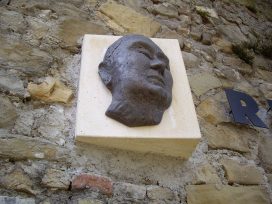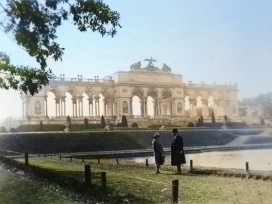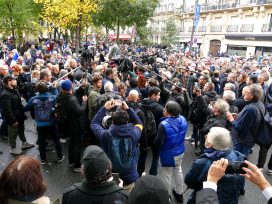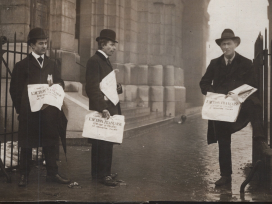Endgame in Paris
Paris in the 1930s was a cauldron of political radicalism. The victory of the Popular Front seemed to some to signal the onset of revolution. But it was more a defensive alliance against the far right, whose enduring threat became a reality sooner than anyone could have imagined.
On February 13th 1936, the French socialist leader Léon Blum left the Palais Bourbon in Paris, the site of the lower house of parliament, to travel the relatively short distance to his home on the île Saint-Louis. He was driven by Georges Monnet, a friend and colleague, and they were accompanied by Monnet’s wife, Germaine. As the Citroën B12 turned from rue de l’Université into the boulevard Saint-Germain it found its progress obstructed by a large crowd which had come to attend the funeral of the historian Jacques Bainville, a leading figure of Action française, the largest and most influential of France’s plethora of right-wing, nationalist and antisemitic organisations.
Finding it impossible to turn around or reverse, Monnet tried to edge forward along the boulevard, but his fine automobile attracted notice. The crowd may or may not have known the driver, but they could not but recognise the man in the back seat. A socialist, a pacifist, an intellectual, and, not of least importance, a Jew, Blum was referred to as ‘l’homme le plus insulté de France’ (the most insulted man in France). Long designated as the chief enemy of the patriotic nation, he had been singled out by the propagandists of the far right for extreme verbal abuse and the intellectual leader of AF, Charles Maurras, had on many occasions called for his murder.
Action française members, probably belonging to the organisation’s paramilitary unit, the camelots du roi, smashed the back and side windows of Monnet’s car and rained blows on Blum’s head. Insults and threats were heard: ‘Death to the Jew!’, ‘To the gallows!’, ‘Blum murderer!’
Two police officers arrived and Blum was carried from the car onto the street, but the camelots continued to surge forward and kick him on the ground. Eventually some workers who had been renovating the facade of a nearby building brought him, covered in blood, to the safety of an inner courtyard on the nearby rue de Lille, from where he was eventually taken to hospital. The profuse bleeding had resulted from the rupture of a vein rather than an artery, which was lucky for Blum. He was also fortunate to have been rescued from the mob before the attacks became more prolonged and possibly life-threatening. In the event he was soon discharged from hospital but spent several weeks convalescing at home, unable to take an active part in the parliamentary election campaign which followed in April and May 1936. He was sixty-three at the time of the attack.
AF’s daily newspaper provided its readers of February 14th with a version of the events of the previous day that diverged from most other press accounts:
As the [Bainville] ceremony was taking place at the funeral parlour [the funeral was a non-religious one as members of Action française had been barred from receiving the sacraments in 1927; the interdict was rescinded by Pius XII in 1939] a magnificent automobile drove at speed into the crowd … One of the occupants declared that he was a parliamentary deputy and that he insisted on being allowed through … People looked into the car and recognised Léon Blum … From the crowd, already incensed, came a unanimous shout of anger. The windows of the car shattered. Things would have gone badly for the socialist leader if the members of the AF and the camelots du roi who were close by had not intervened.
To which the satirical newspaper Le Canard enchaîné responded in its edition a few days later: ‘The odious attack by Mr Léon Blum against Mr Charles Maurras has failed miserably.’
Despite this disavowal of responsibility for the violence, it shortly emerged that Léon Blum’s hat and tie had gone on display as trophies in Action française’s offices. In April, three accused appeared before the courts. Louis Courtois, thought to be the main instigator of the attack, was sentenced to three months in prison; Léon Andurand to fifteen days. The third suspect, Édouard Aragon, threw himself to his knees and begged the court to have a thought for his four children. Germaine Monnet, asked if she could safely identify him as one of the attackers, said she could not be sure. He was acquitted.
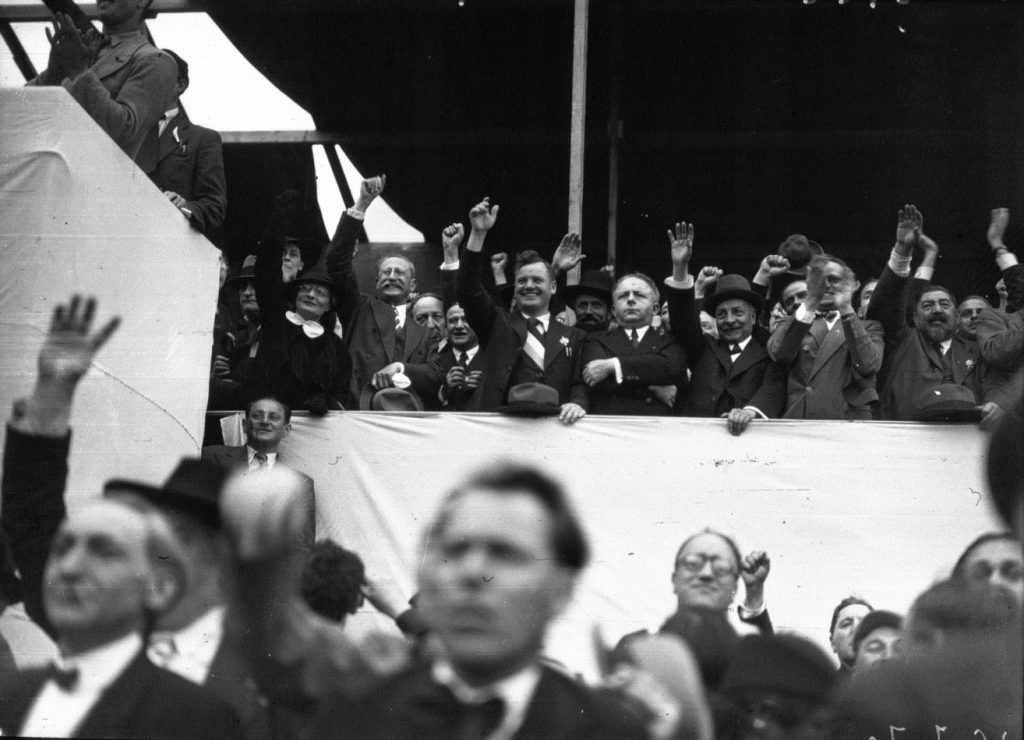
Manifestation held by the Popular Front on July 14, 1936. As seen from the left: Thérèse Blum, Léon Blum, Maurice Thorez, Roger Salengro, Maurice Viollette, Pierre Cot. Image via Wikimedia Commons.
ii
The French far right can trace its ideological origins back to the reaction to the revolution of 1789, a convulsion which, it felt, deprived the country of the essential underpinnings of hierarchy and order, replacing respect for authority with anarchic individualism, harmony with competition and quiet obedience to higher powers with defiance of God’s laws and contempt for His ministers. The most influential voice here was Edmund Burke, through his Reflections on the Revolution in France, published in 1790.
The fatal mistake of the French Revolution, according to Burke, was that in contrast to Britain’s ‘Glorious Revolution’ of 1688, which had the limited objective of reasserting the liberties of parliament against the arbitrary will of the monarch, the French wished to create a new society ex nihilo, taking nothing from the accumulated traditions and practices which had evolved over centuries and which, in Burke’s view, served the people and the state well. After 1789 the French had attempted to build a new society on abstract principles, not least on the abstraction of ‘man’, an artificial creature whose origins derived from the intellectual speculation of the Enlightenment philosophes: he (never she) was not the flesh and blood man that we know, born into and conditioned by particular circumstances of birth and education, but an intellectual concoction largely composed of political and economic striving and everywhere, in every society and every circumstance, though apparently ‘individual’, in essence the same.
A later reactionary thinker, Joseph de Maistre, thinking along the same lines, was even more scathing. The 1795 French constitution, he observed, was made in the name of ‘man’. ‘Yet this man does not exist anywhere in the world. I’ve seen in my time French men, Italian men, Russian men; I even know, thanks to Montesquieu [author of Lettres Persanes] that one can be Persian. But as for man, I have to say I’ve never met one in my life; if such a creature exists it is certainly outside of my experience.’
One of the essential bases on which a properly functioning society must rest, according to Burke, was respect for religion, which ‘has, and must have, [a] large mixture of salutary fear’: in other words it must act as a brake on bad behaviour, including, and perhaps particularly, any tendency to act on a desire to enjoy possession of what is not yours (‘Thou shalt not covet they neighbour’s house …’). The royalist pamphleteer Antoine de Rivarol, who died in 1801, had written: ‘It is not a question of establishing whether religion is true or false but rather whether it is necessary.’ This idea may bear some relation to the more modern notion that, even if the tenets of revealed religion are not in any literal or empirical sense ‘true’, they may nevertheless have a positive effect in brokering social peace or offering a comprehensive, if largely metaphorical, framework with which to process offence, guilt, forgiveness, loss and mortality.
But Rivarol’s perspective is quite different: religion is not to be recommended because it may be beneficial to the believer or the community of believers; rather it is seen as beneficial, indeed necessary, to society – and by ‘society’ here we must surely understand the possessing classes. Voltaire, a deist rather than an atheist, expressed much the same view with his usual zestful cynicism: ‘by all means let us discuss the possibility that God does not exist, but let me first send my servants home lest I have my throat cut in bed’.
Another fundamental objection which the reactionary right had to the ideology of the Revolution was its championing of equality. Equality is against nature, Burke argued: there is no society without elites and there is nothing unjust about according a certain pre-eminence to those whose birth qualifies them for the most noble roles in governance – birth here of course means ‘high’ birth.
Burke was perhaps something of a moderate as regards this principle: an important role in society for aristocrats could be justified, but high office should not be their exclusive privilege: if he was himself perhaps the most gifted intellectual of his generation, in his social background he was suspect, the son and brother of practising Irish Catholics, while his father was a mere solicitor. One must of course accord to aristocratic society, with the beneficial continuity embodied in the practice of inheritance, its entitlements; but some allowance should also be made for talent.
The push and pull between those who accepted and those who rejected the changes brought about by the French Revolution was to continue into the mid-century and beyond, with no complete victory for either side but against a background of what seemed to be a general slow ebb of royalist sentiment and a sullen withdrawal of many of the supporters of tradition and religion into more or less impotent exile from political life. A number of circumstances were to come together in the 1870s and 1880s however which again energised the reactionary right, giving it a new ideological orientation and, even more valuably, new enemies.
Defeat by Germany in the Franco-Prussian war of 1870 and the subsequent uprising of the Paris communards and its bloody suppression shocked and demoralised the country. The annexation by Germany of most of Alsace and parts of Lorraine, agreed in the treaty which ended the war, led to considerable migration to Paris and other urban centres from ‘the lost provinces’, much of it from Jewish citizens who felt they would enjoy greater civil rights by opting for France rather than being absorbed into Germany.
In 1881 the Assumptionist order’s journal La Croix (The Cross) wrote: ‘The Jews are not popular in France; their hypocritical tricks have a way of annoying us.’ If Catholic antisemitism was, for the moment, largely a matter of a racial hostility built on top of theological foundations it was soon to merge with other currents drawing on nationalism and xenophobia, or the new pseudo-discipline of ‘racial science’, all of which came together in a great gush in Édouard Drumont’s 1,200-page ‘pamphlet’ La France Juive. ‘Everywhere,’ Drumont told his readers, ‘you will find the Jew attempting to destroy, directly or indirectly, our religion.’
But it wasn’t just a question of religion. Drumont also campaigned, with a somewhat poorer and less religious audience in mind, against ‘the Jewish capitalist’, who was despoiling the ‘honest and hardworking’ Frenchman. Racial science, he wrote, demonstrated that the Jew was physically and morally different, that there had always been a fundamental conflict between Aryan and Semite. The two races had nothing in common, the Semite being ‘mercantile, avaricious, scheming, subtle, cunning’ while the Aryan was ‘enthusiastic, heroic, chivalrous, unselfish, straightforward, confiding to a fault’.
The Dreyfus Affair, involving a Jewish army officer convicted of passing secrets to the Germans, had everything to interest Drumont, who had, from 1892, campaigned against allowing Jews into the army officer corps. The affair dragged on from 1894, when Captain Alfred Dreyfus was found guilty of espionage on very flimsy evidence, to 1906, when he was finally cleared and reinstated in the army. The long-running controversy over Dreyfus’s guilt or innocence – and more importantly the possible guilt of the higher echelons of the army if he had been framed – deeply divided France. When emerging evidence began to make it clear that Dreyfus was indeed innocent, Drumont insisted that evidence was beside the point: ‘It’s a question of race; all the logic-chopping is irrelevant.’ For the anti-Dreyfusards it was politically necessary that the higher echelons of the army be without sin; and therefore it was necessary that Dreyfus be guilty.
The ferocity with which the case against Dreyfus was prosecuted in the press and the patent unwillingness of the anti-Dreyfusards to accept that the army, together with the church a pillar of the nation, could possibly be guilty of duplicity, might have led some to believe that France was a deeply antisemitic society. But the defence of the Jewish officer was conducted with equal vigour – and certainly with greater intellectual distinction. The father of the philosopher Emmanuel Levinas in Kaunas, a city then in Russia and today in Lithuania, advised his son, who would soon be compelled to emigrate in order to benefit from a university education, to choose France: ‘A country that tears itself apart to defend the honour of a small Jewish captain,’ he said, ‘is somewhere worth going.’
The leadership of the far right in France would soon pass on to two figures who were more intellectually equipped for it than was Drumont. These were Maurice Barrès (1862-1923) and Charles Maurras (1868-1952). Without in any way distancing themselves from any of the pre-existing elements of far-right ideology – its respect for hierarchy, its anti-egalitarianism and antisemitism, Barrès and Maurras were to contribute to the movement taking a strong nationalist turn, which in the case of the former had a distinctly mystical flavour. A new addition to the French language which emerged in the course of the Dreyfus controversy was the word ‘intellectual’ (intellectuel). It was a term of disparagement, which Barrès defined thus: an intellectual is ‘an individual who persuades himself that society should be founded on logic and who fails to realise that it is in fact built on more fundamental necessities, which may well not be amenable to individual reason’.
And what were these more fundamental ‘necessities’? In La Terre et les Morts (The land and the dead, 1899), Barrès wrote: ‘This voice of our ancestors … nothing is more valuable than this for forming the conscience of a people. The land gives us a discipline. And we are the continuation of our ancestors. It is on that reality that we should found ourselves.’ This was something that of course ‘intellectuals’ could not grasp. Four years later, Barrès wrote: ‘Certain people think themselves more cultured because they have stifled the voice of blood and the attachment to place [l’instinct du terroir]. They claim to be regulated by laws which they have chosen themselves, laws which, while they may in themselves be quite logical, risk blocking off our deepest energies. As for us, to preserve ourselves from a sterile anarchy, we wish to connect with our land and our dead.’
If Barrès was somewhat sentimental with regard to the French soil and the dead generations it enfolded, he was less so with regard to the living. A line from his novel Les Déracinés (The rootless), published in 1897, can be taken to sum up his feelings about men and women of no property: ‘A primary condition of social peace is that the poor should have a lively awareness of their powerlessness.’ Maurras, who was to become the undisputed intellectual leader of the far right after Barrès’s death, added another two targets to its traditional list of enemies: Protestants and freemasons. He also made Action française officially a monarchist movement, though in practice the poor human quality of the royalist pretenders made the project of restoration something of a dead letter.
For the far right ideologues it was not the least of the virtues of the institutional Catholic church – like Barrès, Maurras personally lacked religious faith – that in strong contrast to Protestantism it had drawn the teeth of the Gospel message (its texts composed by ‘four obscure Jews’), chiefly by denying the faithful access to it, substituting instead a web of soporific ritual in a language they could not understand. Words and ideas could be dangerous. The Magnificat (‘He hath put down the mighty from their seat, and hath exalted the humble. / He hath filled the hungry with good things, and the rich He hath sent empty away.’) Maurras found a particularly offensive text.
Just like Catholicism and royalism, antisemitism was for Maurras to a considerable degree instrumental, a weapon in the political struggle: the essential cornerstone of his philosophy was nationalism. Michel Winock summarises his tactical thinking:
Antisemitism has another virtue, political this time, which is its ability to federate all the forces of the national revival against the revolutionary society incarnated by the Jews. Antisemitism allows us to rally the Catholics, the bourgeois who are victims of competition, the workers who are victims of Capital; it was a vector of an essential inter-class front, a unifying factor which Maurras in 1911 celebrated in these terms: ‘Everything looked impossible, or frightfully difficult, without this providential antisemitism. Through it, all the problems are sorted, smoothed out, simplified. If one wasn’t already an antisemite for national reasons one would become one out of simple opportunism.’
There is no reason whatsoever to doubt that Maurras was not already an antisemite by conviction. But by the time the far right actually came to power on the back of the defeat of the French army in 1940, he had been to some degree passed out by younger acolytes with even more extreme views than his who ardently admired Nazi Germany and seemed unabashed by the most radical solutions to ‘the Jewish problem’.
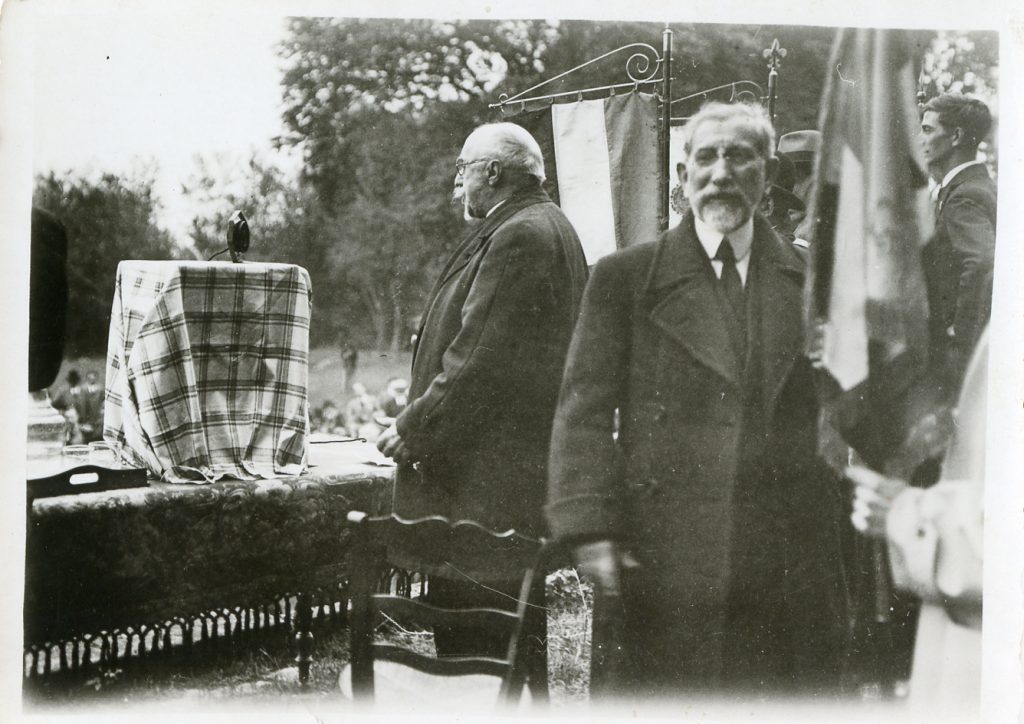
An Action Française meeting at Mont Renaud 1931. At the front: Charles Maurras, in the back: Antoine Schwerer, president of Action Française between 1930 until 1935. Image via Wikimedia commons.
iii
The French parliamentary elections of 1936, coming less than three months after the assault on Léon Blum, produced a result that surprised many, probably including the chief beneficiary. First, the election produced a clear victory for the parties of the left, which returned 386 deputies to the right’s 224. Second, within that left grouping, the socialists (formally the French Section of the Socialist International – SFIO) emerged as the largest party, with 149 seats, as against the radicals’ 115 and the communists’ seventy-two. The government that followed, commonly referred to as the Popular Front, was hated and feared by many in France, while its performance in government was to be later assessed by others, particularly those on the more radical left, as at best disappointing.
Léon Blum’s biographer Jean Lacouture makes a number of cogent points about the Popular Front experience, which lasted less than two years. First, the Front was in many ways a defensive alliance against the threat of the far right. The electoral victory of the left may have constituted a defeat for the right but the threat it represented did not go away: the radical right, after all, cared little for elections or democracy.
Second, the Front was a coalition, which depended on, and could not survive without, the support of all of its components: socialists, communists, radicals. Third, the relative weight of the parties after the election came as a surprise to almost everyone; what had been expected was a government in which the radicals would have the preponderant role and the socialists, and perhaps the communists, would offer support based on some concessions to their own political programmes. The socialists, not expecting to lead, were not up to speed with the realities of the financial situation.
Fourth, the Front took power after a period of austerity and deflation; its Keynesian policies of stimulation of consumption and state sponsorship of large-scale public works were stubbornly resisted by the institutions that controlled credit. Fifth, the international climate, particularly after the nationalist rebellion in Spain, supported by the Axis powers, was extremely dangerous. If France’s reformist phase was to look like developing into a revolutionary one, the consequences could not be foreseen.
Sixth, Léon Blum, though a subtle theoretician, perhaps did not adequately realise that being in government did not necessarily mean being in power. In particular, he did not and his government did not after 1936 enjoy a monopoly of the use of force. There were serious reasons to doubt the army’s loyalty to the government (or even to the republic); and the same, to a lesser degree, could be said of the police.
The change of government in May/June 1936 was accompanied by a nationwide wave of strikes and factory occupations. To many it seemed that France was in a revolutionary situation: the left-wing socialist Marceau Pivert indeed gleefully proclaimed that now ‘everything is possible’. The incoming Blum government, formed on June 4th, met with the employers and proceeded to negotiate an end to the occupations based on a raft of concessions that would compensate workers for the severe loss of purchasing power they had experienced under the previous government’s deflationary policies.
The Matignon Accords, signed on June 7th and 8th, allowed for union recognition in the factories and the right of the workers to choose their own shop stewards and engage in collective bargaining, a wage increase of 7 per cent for higher salaries and 15 per cent for lower and an undertaking from the employers that there would be no victimisation of workers for their actions during the occupations. Blum added that his government would immediately legislate for a forty-hour week and two weeks’ paid holiday per year.
Yet in spite of the Matignon agreement the strikes continued in many places. At this point the communist party (PCF), which was certainly supported by a greater proportion of the industrial working class than were the socialists, threw its weight behind the deal. ‘One must know how to end a strike when satisfaction has been achieved,’ the communist leader, Maurice Thorez, declared. Indeed one might in practice often need to end it even if not all one’s demands had been met.
The explosion of strikes in spring 1936 should be seen not just in the context of depressed wages and the desire of the working class to ‘catch up’. The actions were also a revolt against the system of repression that reigned in the industrial sphere, with workers on the assembly line supervised at every moment, forced to be silent when working and often treated as if they were prisoners performing forced labour. The factory occupations were also marked by a burst of optimism, closely related of course to hopes of reform from the new government.
The philosopher Simone Weil, sympathetic to anarchism, who had herself worked for considerable periods on an assembly line, characterised the work stoppages as ‘strikes of joy’. She wrote: ‘I went to see my friends in a factory where I worked several months ago … the joy of being able to walk around the workshops instead of being tied to the machine … the joy of hearing, instead of the pitiless racket of the machines, music, songs, laughter … the joy of walking past the bosses with one’s head held high … the joy of living, among these silent machines, at the rhythm of human life.’ It was true of course, Weil added, that things would soon return to the way they had been, but for the moment the workers did not dwell on that. They were enjoying a holiday from ‘normal’.
They may also have been consoled by the prospect of taking, for the first time, an actual holiday as the Popular Front legislated for annual leave and cut train fares to enable workers and their families to taste for the first time the delights of the French countryside. At the same time, the Front’s minister for education, Jean Zay, enlisted the director of the national library, Julien Cain, in an ambitious and imaginative programme of bringing books to a part of society they had not greatly touched before, significantly increasing funding for public libraries, initiating mobile libraries and services for children. The poet Paul Valéry wrote of Cain: ‘He is without doubt the man to whom the organisation of French literature owes the most.’
The prospect that the poor, or the working classes, might lose that ‘lively sense of their powerlessness’ that Barrès had deemed essential to social peace, that they might have the hope that they could improve their lives or their children’s, that they might widen their physical or cultural horizons, was an extremely unwelcome one to the dogmatists of the nationalist right. Indeed figures like Lucien Rebatet, a journalist and critic chiefly associated in the 1930s with the literary-political review Je suis partout (I am everywhere), could be said quite simply to hate the sight of the working class, and particularly its women.
Returning to Paris after a short trip just after the elections of 1936 he found a city teeming with joyous proletarians, taking their Sunday stroll from République to Nation, ‘well-fed, tanned, fresh and plump in their silk blouses, flannel pants and sparkly yellow shoes, celebrating proudly the new era of beach holidays, new cars, dining rooms furnished in cheap walnut, lobster, leg of lamb and triple apéritif’. On July 14th he was appalled to see left-wing crowds, including communists, joining in the festivities: ‘the last armoured cars had barely passed before monstrous families of Berlin yids proceeded up the Champs-Élysées exclaiming “Long leef ze popular vront!”’
The far right had two unbudgeable ideas about the Popular Front: first, that it was manipulated by the communists, who were clearly the real power, second that it was not in any way national or French. As regards the former, it might be noted that the communists were not in the Popular Front government but supported it from outside; also that the PCF of 1936 was a different animal from that of a few years previously.
Hitler’s accession to power in 1933, which Moscow had not been expecting, had moved the Comintern away from its previous sectarian policy of ‘class against class’ to a model of co-operation with other left-wing parties and centrists to block the path to power of the far right. And if Action française persisted in thinking that the Front was ultimately being manipulated by Moscow they were also sure that its leader was no more than a tool of international Jewry. Léon Blum, whose grandfather came from Alsace and whose father and uncles ran a successful haberdashery shop in Paris, was always denied by his enemies the appellation of Frenchman: he was either a German, or, perhaps worse, an oriental or Levantine.
Maurras had once suggested that he should be guillotined, with, as was the custom with parricides, a black veil covering his ‘camel-like features’. Pierre Gaxotte, who performed the function of editor-in-chief of Je suis partout before Robert Brasillach took over, wrote in the review Candide: ‘ … he is ugly, the sorrowful head of a Palestinian mare […] he is the incarnation of everything that revolts our [French] blood and gives us goose pimples. He is evil, he is death.’
iv
In late September 1938, Adolf Hitler issued an ultimatum to the government of Czechoslovakia: the Czechs had four days, until September 28th, to agree to the secession to the Reich of the region the Germans called Sudetenland, heavily populated by German speakers but also essential to the security of the Czech state as a mountainous natural barrier to invasion. By way of reassurance, Hitler insisted to the British and French that this was absolutely his last territorial demand in Europe. The British prime minister, Neville Chamberlain, wished to appease Hitler and avert war while still obtaining guarantees for the security of the rest of Czechoslovakia. There was no appetite for going to war to defend an ally few Britons knew or cared about. Much the same can be assumed of France. Chamberlain reflected the popular mood when he said in a radio address: ‘How horrible, fantastic, incredible it is that we should be digging trenches and trying on gas masks here because of a quarrel in a far-away country between people of whom we know nothing.’
On September 29th a deal was reached at Munich between the British, French, Germans and Italians, but in the absence of the Czechs. The integrity of the Czechoslovak state would have to be sacrificed for peace. Returning to Britain, Chamberlain told a crowd assembled in Downing Street that ‘for the second time in our history, a British prime minister has returned from Germany bringing peace with honour. I believe it is peace for our time. We thank you from the bottom of our hearts. Go home and get a nice quiet sleep.’ The French prime minister, Édouard Daladier, who had also approved the Munich Agreement, was less sanguine. Expecting, on his arrival back at Le Bourget airport to be vilified for his, or his country’s, cowardice, he was surprised to be applauded. According to one diplomat present, he muttered, on emerging from the aircraft and seeing the welcoming party: ‘Ah, the fools! If only they knew.’ In his memoirs he merely says: ‘I was expecting to be greeted with tomatoes and I was greeted with flowers.’ On March 15th, the Germans occupied the remainder of the Czech lands (Bohemia and Moravia). On September 3rd, after they invaded Poland, both Chamberlain and Daladier declared war.
v
On June 10th, 1940, as German tanks advanced within sight of the Seine, Léon Blum composed an editorial for the socialist newspaper Le Populaire. The situation was indeed grave, he wrote. But in spite of the disparity in men and matériel between the French and the Germans, ‘resolution’ on the part of the defending French army could still see off the invaders. This, patently, was wishful thinking. In the next few days Paris was declared an ‘open city’ to save it from destruction. The Germans entered on June 14th. The French had lost approximately 60,000 dead in the six-week campaign of the Battle of France.
Blum was reluctant to leave the capital in spite of the repeated pleas of his friends and political allies. On the evening of June 10th he was driven to Montluçon in central France to consult with his close friend Marx Dormoy, a former minister of the interior in the Popular Front government. On the morning of the 11th the two returned to Paris, where Blum visited the empty parliament building and held consultations with the préfet de police and the American ambassador, William Bullitt. On June 14th he received a call from Georges Mandel, the current interior minister, asking him to come to Bordeaux, where the French government and many parliamentary deputies had sought refuge.
Mandel had arranged the appointment of the relatively junior officer Charles de Gaulle as undersecretary for war and at an overnight meeting in Tours on June 13th/14th had encouraged him to go to London to organise a force of ‘Free French’ resisters. According to de Gaulle in his Mémoires, Mandel told him: ‘You have great duties to fulfil, General, but you have the advantage over us [politicians] of being uncompromised.’
Like Mandel, Blum had hoped that the parliamentarians assembled in Bordeaux would come to a resolution to embark en masse for North Africa to set up a government in exile and continue the fight against Germany from there in concertation with their British allies. But the will to resist appeared to be crumbling. On June 16th, prime minister Paul Reynaud stood down in favour of Marshal Philippe Pétain, a tactical move perhaps as he may have been hoping to be recalled after Pétain failed to negotiate peace with the Germans.
Pétain, however, had already decided that he would accept an armistice at almost any price the Germans demanded. France was already defeated, he believed, and he was convinced he knew why. It had nothing to do with the poor performance of its army in the field or the antiquated military ideas of its generals, deriving rather from his compatriots’ perennial ‘taste for the quiet life’ and their ‘abandonment of effort’ and pursuit of pleasure during the decadent 1930s. It was time now for a period of national contrition and the restoration of the moral order under a new regime, which the marshal, offering his country ‘the gift of my person’, was ready to lead – and dish out the penance.
An assembly of both houses of parliament, deputies and senators, was called for July 9th and 10th in the spa town of Vichy. Pierre Laval, a former prime minister on two occasions in the 1930s who was now hoping to play a prominent role in the post-republican regime, addressed his colleagues with some brutality: ‘We wish to destroy all existing structures … Either you accept to be ruled in the manner of the German or Italian constitutions or Hitler will impose it on you.’
Blum watched with some astonishment the moral collapse of France’s politicians, who had not long before declared their determination to resist the imposition of a dictatorship. ‘The poison that one saw acting derived from fear, true fear and panic … One by one, Laval had – I wouldn’t say persuaded – but infected them all. In all fairness, one would have to say that he is unrivalled in this kind of manoeuvring, of manipulation of men.’ While Blum concluded that his own political career was over, he derived some consolation from the continuing resistance of the British. On September 15th, at 6 am, he was arrested.
Blum was held, together with Georges Mandel, Paul Reynaud, Édouard Daladier and General Maurice Gamelin (one of the few senior army officers whose values were unshakeably republican) at the castle of Chazeron, north of the central city of Clermont-Ferrand. Daladier, Gamelin and Blum were three of five defendants put on trial in the nearby town of Riom in February 1942. The burden of the charge against Blum and Daladier was that, through their acts or omissions of a number of years earlier, they bore responsibility for the French defeat of June 1940. The period the court set itself to examine ran from 1936 to 1940, not reaching back any earlier perhaps because, as Blum pointed out, the minister for war in the 1934 government of Gaston Doumergue, which had presided over a significant cut in expenditure on the armed forces – the Popular Front had increased it – was none other than Philippe Pétain.
Through the forty-hour week and paid holidays, the prosecution argued, Blum and Daladier had pampered the workers and undermined French industry, holding back the production of armaments. Blum replied that he thought that improving the morale of workers could only work to the benefit of production. Daladier, who had been responsible for defence in a number of governments from 1936 to 1940, was scathing about the army leadership. He had, he told the court, wished to promote the manufacture and deployment of heavy tanks – an idea whose chief sponsor was one Colonel de Gaulle – but the body charged with co-ordinating the armed forces (vice-president Philippe Pétain) had blocked the initiative, preparing instead for a static war of defence on a long front, as in 1914-18. They had refused to extend the defensive Maginot line to the sea: Pétain had assured the senate that the Ardennes forest was impassible. Yet it was in this poorly defended section that the Germans cut through in mid-May 1940 – circumventing the Maginot Line.
What had been intended as a well-managed show trial which would demonstrate to the French public the errors and crimes of the accused and the weaknesses of democratic governments could not be said to be going well. The proceedings were reported fully in the foreign press but only very selectively by French newspapers and radio. Pressure now came from the Germans to limit the damage.
Hitler angrily told the Vichy regime that what had been required was a trial establishing the guilt of Blum and Daladier in causing the war, not one that tried to prove their responsibility for losing it. Mussolini said the proceedings were ‘a farce typical of democracy’. Certainly affording the accused the right, however compromised, to defend themselves was not standard practice for a totalitarian regime. At the same time, Vichy France was not a democracy. On April 14th, 1942, after twenty-four sessions, the trial was temporarily suspended. It never resumed.
vi
The armistice agreed between France and Germany in June 1940 had divided the country in two, with an occupied zone in the north and west and a zone called ‘free’ in the south. Article 19 of the agreement also required the authorities in the unoccupied zone to deliver upon request (livrer sur demande) any named person who had fled Germany and sought refuge there. The establishment of Vichy France, officially l’État français (the French state), no longer a republic, was greeted by the intellectuals of the far right with delight. The poet Paul Claudel rejoiced that France had been ‘delivered after sixty years from the yoke of the Radical Party and anti-Catholicism (teachers, lawyers, Jews, freemasons) … [He now cherhished the] hope that we may be delivered from universal suffrage and parliamentarism’. Charles Maurras, for his part, spoke of a ‘divine surprise’.
Meanwhile, on June 18th, Charles de Gaulle, speaking from London, told his compatriots (or those few who heard him on BBC radio) that the struggle was not lost, that France still had her colonies, that it had its ally Great Britain, with its command of the seas, that it could also, when the time came to take back France, depend on the massive industrial capacity of the United States. Of more immediate importance for those who wished to resist Germany was the failure of the Luftwaffe, over the summer and autumn of 1940, to defeat the RAF in the Battle of Britain. Hitler’s desire to knock Britain out of the war – even to enter London in triumph, as he had earlier boasted of accomplishing by mid-August – was to remain unfulfilled. It might, in the end, turn out to be a long war after all.
French collaboration with the German occupiers came in a variety of intensities: resigned or sullen on the part of the greater part of the population; masochistic and accepting yet not entirely identifying with German war aims on the part of Marshal Pétain; enthusiastic, among those who hoped to progress in their new careers with the Vichy state or who were in the process of abandoning traditional right-wing French nationalism to embrace fascism and Nazism. Many of the writers of Je suis partout came into the last category, particularly after Pierre Gaxotte, insufficiently enthused by Hitler and Mussolin, was replaced by Robert Brasillach as editor-in-chief. Brasillach and Lucien Rebatet, who had come from the Action française tradition, now grew critical of Maurras, and he of them.
Maurras was perfectly willing to put his faith in Pétain, but as a French patriot of a traditional stripe, never in the Germans. In 1937 Brasillach visited the Nazi party rally in Nuremberg, where he heard Hitler speak and was introduced to one Otto Abetz, later to be an important contact for him when, during the Occupation, he became German ambassador to Paris and co-ordinated support among the collaborationist elite for the new European order, in which France might be allowed to play a part. At Nuremberg, Brasillach was above all impressed by the youth of almost everyone he met: ‘it would have been easy to forget that there were Germans of more than twenty-five, and indeed that it was they who created national socialism; now the movement is no longer for them; it is for the youth.’
vii
In May 1943, German and Italian troops surrendered in North Africa. In July, the allies invaded Sicily, a prologue to a very slow progress up the Italian peninsula. In June of the following year the Normandy front was opened and in August Paris was liberated. As the Russians advanced inexorably from the east, US troops, in September, reached the Siegfried Line and crossed into Germany.
In the same month the Germans set up a puppet French ‘government in exile’ in the town of Sigmaringen in Baden-Württemberg. More than a thousand of the most hardened collaborators, including Lucien Rebatet, fled there, in the forlorn hope that the course of the war could still, somehow, be reversed. Philippe Pétain and Pierre Laval were brought there against their will and refused to co-operate with the ‘government’, presided over by Fernand de Brinon. As the French army advanced on Sigmaringen in the following April. Pétain first sought refuge in Switzerland, then made clear his willingness to be returned to France. He was put on trial for high treason in July and condemned to death in August but the sentence was commuted to life imprisonment. Suffering from dementia, he was released from prison a month before his death in 1951. In May 1945 Pierre Laval fled by air to Spain but was handed over to the French by the authorities there. After a trial for treason he was executed by firing squad in October 1945.
Robert Brasillach surrendered to the French authorities in Paris in September 1944. In January 1945, after a trial that lasted only six hours and a deliberation by the jury for twenty minutes he was sentenced to death for collaboration with the enemy: his most keenly felt crime had been to identify in print enemies of the regime and call for their hunting down and murder. A number of writers and intellectuals banded together to organise a petition for clemency on his behalf to be addressed to General de Gaulle, the head of the provisional government.
Albert Camus, who had been engaging in a public dispute with the Catholic novelist François Mauriac over the conflicting demands of justice and mercy – Camus tended to favour justice, though he was gradually to come closer to Mauriac’s stance – received a letter from the writer Marcel Aymé asking him to sign. Camus reluctantly agreed, though making it clear to Aymé that his motivation in this was opposition to the death penalty rather than any regard for Brasillach as a writer, still less as a human being. Camus later also intervened on behalf of Rebatet, stating: ‘Whatever one may say or think, no country in the world can do without pity, and rather than put a man to death, it is more urgent and more exemplary to give him the occasion to think about his offence.’ On that occasion the petition was successful. Brasillach was refused a pardon and was executed by firing squad in February 1945. Many years later, de Gaulle spoke to a journalist about his reasons for refusing mercy.
So many unfortunates were summarily executed at the Liberation because they’d allowed themselves to get mixed up in collaboration. Why should those who dragged them into it … be allowed to run between the raindrops? An intellectual is not less, but more, responsible than others. He is an instigator of the actions of others … Brasillach was intelligent. He had talent. What he did is accordingly more serious. His involvement in collaboration strengthened the Nazis. An intellectual cannot be given more leeway than anyone else. He should be given less, because he is better informed, more capable of critical thinking, and so more guilty. His words are arrows, his fine phrases bullets. He can change the public mind. He can’t be allowed to enjoy the advantages of that power and reject its disadvantages. When the time for justice comes, he must pay.
viii
Léon Blum was rescued by Allied troops from imprisonment in South Tyrol in May 1945. On his return to France, he learned of the death of his younger brother, the art critic and theatrical director René, who had been deported from Drancy to Auschwitz in September 1942 and was murdered on arrival by the SS. In 1945 he published À l’échelle humaine (On the human scale), a meditation on democracy and socialism and a reflection – in part self-critical – on the decisions he had made while parliamentary leader of the SFIO. He resumed his role as a political writer for the socialist newspaper Le Populaire and briefly became prime minister again in a transitional government in 1946/47. He died following a heart attack in March 1950 at his home in Jouy-en-Josas near Versailles. He was seventy-seven.
Blum’s friend and colleague Marx Dormoy was murdered in July 1941 when a bomb with a timing device was placed under his bed, the killing a possible act of revenge for his role as interior minister in suppressing the right-wing terrorist organisation the Cagoule. Three suspects were arrested but were never brought to trial; they were released by the Germans in January 1943.
Georges Mandel, along with Reynaud, Daladier and Gamelin, was condemned to life imprisonment in 1941. In the following year he was taken to Germany, where for a period he was detained in the same special camp for the politicians of occupied countries as Blum. He was later taken back to the Santé prison in Paris, from where he was abducted by the fascist paramilitary force the Milice and murdered in the forest of Fontainebleau on July 7th, 1944.
In June 1940 Simone Weil fled with her family from Paris to Marseille in the unoccupied zone, where she soon became involved in Resistance activities. Excluded from university by the new antisemitic racial laws of 1940 and 1941, she found work as an agricultural labourer, spending what free time she had in the intense study of philosophy and Christian and other religions. She accompanied her parents when they emigrated to the United States in 1942 but came back later that year to work with the exiled Free French administration in London. Frustrated in her desire to return to France to take an active military part in the Resistance, she became ill with tuberculosis and died in a sanatorium in August 1943, aged thirty-four. She is buried in the Catholic cemetery in Ashford, Kent.
In January 1945 Charles Maurras was found guilty of high treason and collusion with the enemy and sentenced to life imprisonment. On hearing the sentence he declared: ‘It’s the revenge of Dreyfus.’ At his trial he claimed that he had not realised that identifying political opponents as Jews could lead to their arrest or murder. He also insisted that his numerous incitements to physical violence against his enemies were not meant to be taken literally: they were essentially rhetorical barbs. Maurras’s conviction for treason brought with it his automatic exclusion from the Académie française, but the academicians decided that his seat would not, as per normal procedure, be quickly filled but would remain vacant until after his death. In March 1952 he was granted a presidential pardon on grounds of ill health and he died in November of that year.
Lucien Rebatet, having fled to Germany in autumn 1944, was arrested in May 1946 and in November of that year condemned to death. Following a petition for clemency signed by several writers, including Camus and Mauriac, his sentence was commuted to penal servitude for life. In 1951 Gallimard published his novel Les Deux Étendards (The two standards), which was hailed by many critics as a masterpiece. In the following year he was released from prison. Later in the decade he took up professional journalism again, writing for the antisemitic and negationist review Rivarol (named in honour of the royalist reactionary quoted above). In a radio interview in 1969, asked if he was ashamed of his role in the 1930s and during the war, he replied: ‘Not in the slightest. If I was ashamed I wouldn’t be here in front of this microphone. I fought for the cause that I thought just.’ Rebatet died in 1972.
Pierre Gaxotte had become convinced at a quite early stage that the Axis powers would lose the war. Though he remained an antisemite, he was not attracted to fascism and he did not support Pétain: thus he was not pursued at the end of the war. Largely abandoning politics, he concentrated on his work as an historian. He was elected a member of the Académie française in 1953. The academy, founded in 1635, admitted its first woman member, the novelist Marguerite Yourcenar, in 1980. For Gaxotte this was a retrograde step: ‘If we elect a woman,’ he said, ‘we’ll end up electing a negro.’ He died in 1982.
Otto Abetz was condemned to twenty years’ penal servitude by a military tribunal in Paris in 1949 for his role in organising the deportation of Jews from Drancy to extermination camps in the east. He was pardoned in 1954 and died four years later in a car accident in Langenfeld, between Düsseldorf and Cologne.
Published 20 October 2023
Original in English
First published by Dublin Review of Books 1/10/2023
Contributed by Dublin Review of Books © Enda O'Doherty / Dublin Review of Books / Eurozine
PDF/PRINTNewsletter
Subscribe to know what’s worth thinking about.
Related Articles
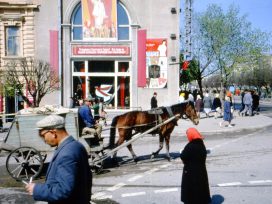
Decolonizing Russia?
Thoughts and warnings from Russia’s first imperial collapse
The ‘decolonizing’ turn in historiography emphasises culture over politics, overlooking anti-imperialism’s frequent descent into authoritarian nationalism. So how can critical histories of the Russian empire account for nationalist deformations?

Three years after the mass anti-regime protests in Belarus, the pro-Russian state continues to brutally repress all expressions of national identity. But people have not forgotten their experiences in 2020 and believe that Belarus’s long history of foreign rule is nearing its end.

